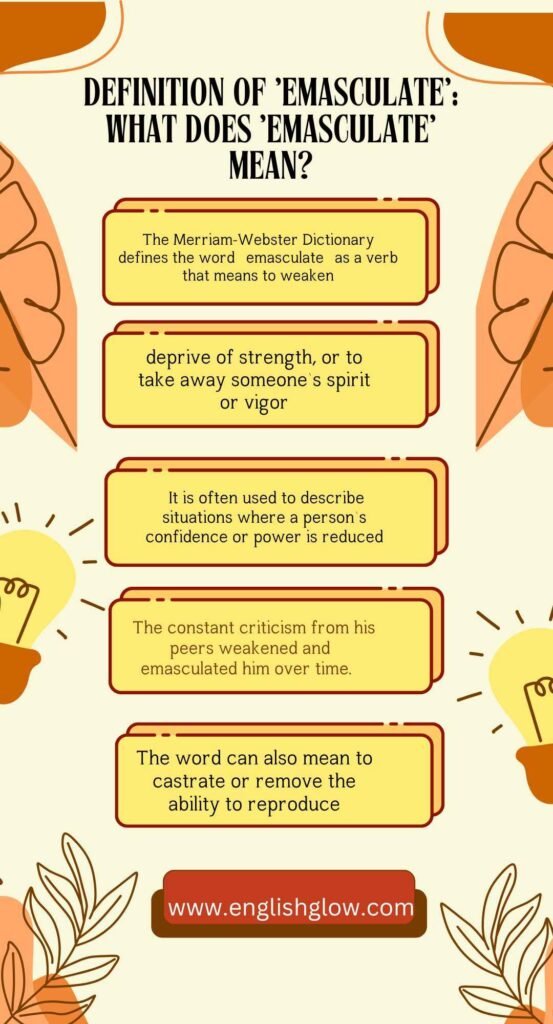The words “Emasculate” and “Demasculate” are often confusing for many people. While both may sound similar, they have very different meanings and one of them is not even a correct English word. “Emasculate” is a verb that means to deprive someone of their masculinity, strength, or power. For example, if someone feels weakened or castrated, we can say that they have been emasculated. This term is also used in a metaphorical sense, such as in the phrase “He felt emasculated after losing his position at work.”On thr hand, “Demasculate” is a misspelling and not a proper English word. People often confuse it with “emasculate” because many words that mean the opposite of the base word use the prefix “de-”. For instance, words like “Deconstruct,” “Demote,” and “Deactivate” all begin with “de-,” which can mislead people into thinking “demasculate” is correct. However, this is not the case, and using “demasculate” would be an error.In contrast, “Emasculate” uses the prefix “e-”, which originates from Latin and means “out” or “thoroughly”. Words like “Evade”, meaning to avoid, or “Emit”, meaning to discharge something like radiation or chemical gases, also use the “e-” prefix. This makes it clear that “emasculate” is derived to express the idea of removing or taking away strength or virility.Here’s an example: “He felt emasculated by the criticism he received from his boss.” In this sentence, “emasculated” correctly describes the feeling of being deprived of confidence or vigor. Meanwhile, using “demasculate” here would be incorrect and grammatically inaccurate. To avoid confusion, always remember that “Emasculate” is the right word to use, while “Demasculate” should be avoided as it is not a recognized term in English.
Definition of ‘Emasculate’: What Does ‘Emasculate’ Mean?
The Merriam-Webster Dictionary defines the word “emasculate” as a verb that means to weaken, deprive of strength, or to take away someone’s spirit or vigor. It is often used to describe situations where a person’s confidence or power is reduced. For example, “The constant criticism from his peers weakened and emasculated him over time.”
The word can also mean to castrate or remove the ability to reproduce. In this context, it refers to an even more intense loss, not just in terms of power but also in terms of physical ability. When we talk about artificial cross-pollination, the term “emasculate” is used to describe the act of removing the male parts of a flower to prevent it from reproducing on its own. This is a common technique used by botanists during artificial breeding.
By understanding the true meaning of “emasculate,” we can see how this word conveys a strong sense of loss or deprivation, whether it’s about strength, spirit, or physical ability. Always be careful when using this term, as it has strong implications depending on the context.
you might enjoy reading: Loot vs. Lute Uncovering the Surprising Connection
Pronunciation: How to Say Emasculate
If you’re an aspiring or experienced freelance writer, mastering the pronunciation of complex words like “emasculate” can help you gain confidence when communicating. Whether you’re speaking verbally or through written communication, knowing how to say a word correctly is crucial. To pronounce “emasculate,” follow this pronunciation guide: “ee-MAS-kyuh-late.” Practicing the correct phonetic spelling will make it easier to use this word in both casual and professional settings.
Learning proper pronunciation is an important skill for speech writers as well, as it ensures clarity and precision. If you’re not confident, you can always look up the phonetic spelling of difficult words. Following a pronunciation guide step-by-step can make it easier to say words like “emasculate” naturally.
When speaking or writing, keep this pronunciation tip in mind: “ee-MAS-kyuh-late”. Using the correct pronunciation can enhance your credibility as
It’s important to note that among the terms ’emasculate’ and ‘demasculate,’ only ’emasculate’ is recognized in English. We’ve previously examined the literal definition of ’emasculate.’ However, it’s often employed in a metaphorical sense by many today. Let’s explore how and when to use ’emasculate.’
Metaphorically, you can use ’emasculate’ to indicate that one person causes another to feel less masculine. For instance, you might say:
She emasculated her son when she scolded him, declaring, ‘You aren’t a man. You can’t even take care of yourself.’
On the other hand, in a literal context, ’emasculate’ refers to the act of castration. For example, you could say:
I felt awful when we had to emasculate our dog, but I recognized it was for his own good. He kept trying to escape to join the female dogs in the area.
Additionally, ’emasculate’ can describe a man who feels diminished in his masculinity due to another’s actions. You might say:
The star football player appeared to single-handedly lead the team to the playoffs, which emasculated some of his fellow players.
Finally, you can use ’emasculate’ to denote any action that effectively takes away a man’s capacity to engage in sexual activity.
For example,
The lawmaker proposed a bill allowing the state to emasculate sexual offenders through chemical castration.
The word “emasculate” can be used in many contexts to show how someone is made to feel weak or inferior. For example, a meek husband who has been emasculated by his domineering wife may lose his sense of confidence and strength. Similarly, a blogger might write an article about how weak men have become in modern times, which could leave some readers feeling emasculated. This term can be powerful, so it’s essential to learn different ways to use it correctly.
In a family setting, a parent should never emasculate their sons by making them feel incapable or insulting their abilities. For instance, saying something like “You’re not a man; you can’t even take care of yourself” can deeply affect a boy’s sense of self-worth. Another example is a best-selling book that might paint a graphic image of a main character being emasculated in front of a crowd of onlookers. This creates a vivid picture of how the word can be applied to literature or real-life situations.
In pop culture, a notable example comes from Game of Thrones. Fans were shocked and saddened when Ramsay Snow emasculated Theon Greyjoy in a highly disturbing scene. This usage of “emasculate” shows how someone can be stripped of their strength, spirit, or even procreative power. It’s a strong term that conveys a deep sense of loss or deprivation.
For everyday situations, you might use “emasculate” like this: “Having a female boss is no reason for men to feel emasculated. Some men think that working under a woman makes them feel like less of a man, but this mindset can prevent them from appreciating their own value.” This example shows how emasculate can describe a change in how men perceive themselves due to certain social dynamics.
Examples of emasculate in a Sentence
Example: “He felt completely emasculated at work when his colleague, a much younger woman, easily took over his role and responsibilities without any struggle.”
Example:Example: “The author published an e-book discussing how society emasculates men through the imposition of unrealistic expectations, but it didn’t perform well in sales due to its high price.”
Example: “Watching the boys emasculate the younger child on the playground was heartbreaking; he already felt inferior for being shorter than his classmates.”
Example: “Critics warned that the new reforms would emasculate the law, leaving it powerless to serve its intended purpose.”
Recap: ‘Emasculate’ or ‘Demasculate’
Let’s recap what we’ve learned about the difference between “emasculate” and “demasculate.” The word “emasculate” is a verb that means to remove someone’s vigor, spirit, or masculinity. It can also mean to castrate or to remove the male genitals. On the other hand, “demasculate” is not an actual English word. It’s a common misspelling of “emasculate” and should be avoided in professional writing.
Some English words can be challenging for writers to remember, especially when they sound similar but have different meanings. As a writer, it’s important to use these words accurately to build trust with your audience and position yourself as a subject matter expert. Misusing words like these can make readers question your ability to provide accurate information on a topic.
If you question the accuracy of a term, it’s always best to verify its meaning before using it. For example, if you find yourself confused between “emasculate” and “demasculate,” remember that “emasculate” is the accurate term to describe weakening or removing masculinity. It’s a good idea to revisit this lesson whenever you need a quick review to ensure you’re using the correct version.
To keep improving, learn about other words that may stump writers in the grammar section or stay current on the latest industry changes and best practices. This will help you stay informed and always use the right words when writing or reading.
you might enjoy reading: By Which or In Which? Master the Subtle Difference Instantly
Is “Demasculate” a word ?
I recently heard someone refer to a man being “demasculated,” and it sounded quite odd to my ears. Curious to know if it was a real word, I did a quick Google search, but came up empty when looking through Merriam-Webster and Dictionary.com. I found some articles using the term “demasculate,” but there was nothing educational or scientific about them. Most of the results were from urban dictionaries and trendy media companies, indicating that “demasculate” is not an accepted English word.
“Demasculate” is the kind of word you might make up if you didn’t know the correct one. The proper term to use is “emasculate.” So, if you ever hear someone using “demasculate,” it’s best to politely inform them that it is not an actual English word and doesn’t have any formal definition or recognition.
Always check reliable sources like Merriam-Webster or Dictionary.com to ensure a word is valid before using it in your writing. It helps avoid confusion and makes you appear more knowledgeable. When in doubt, it’s better to use the correct word, such as “emasculate,” rather than relying on made-up terms like “demasculate.”
Why is it ‘Emasculated’ Rather Than ‘Demasculated’?
The term “emasculated” has its origins in the Latin word “emasculare,” which means “to remove the male sex organs” or “to make effeminate.” The prefix “e-” in Latin often means “out of” or “away from,” which aligns with the idea of removing masculinity or male attributes. This is why the word “emasculated” is used to describe the loss of masculine qualities or strength—whether it’s literally or metaphorically.
On the other hand, the word “demasculated” is not recognized in English. While the prefix “de-” usually means “to remove” or “to reverse,” using it in this context would imply a process that is not traditionally acknowledged when talking about masculinity. Therefore, “emasculated” has become the standard term for describing the loss of masculinity or male qualities.
In summary, “emasculated” is the established term because of its historical and linguistic roots. The word has been used for centuries to convey a specific meaning related to the loss of masculine strength or attributes. In contrast, “demasculated” lacks the same recognition and usage in the English language and does not have any solid historical background.
So, when describing the loss of masculine qualities, it’s always correct to use “emasculated.” This term is widely recognized and understood in both formal and informal settings, while “demasculated” is seen as a misuse or an incorrect form in the English language.
FAQ
What does “Demasculating” mean?
“Demasculating” refers to the act of depriving someone of their perceived masculine qualities or undermining their masculinity. It is often used to describe situations where traditional notions of masculinity are diminished or challenged.
What is a synonym for “Demasculated”?
Synonyms for “demasculated” include “emasculated,” “weakened,” “disempowered,” “unmanned,” or “castrated” (in a more literal sense). These words convey a loss of strength, power, or traditional masculine traits.
What is the meaning of “Emasculate”?
“Emasculate” means to deprive someone (typically a man) of their strength, power, or masculinity. It can also refer to making someone feel weak or less effective, often in a figurative sense. In a literal context, it can mean castrating a male.
What is the adjective form of “Emasculate”?
The adjective form of “emasculate” is “emasculated.” It describes someone or something that has been weakened or deprived of their masculine qualities. For example, “He felt emasculated after the incident.”
Is it “emasculate” or “demasculate” in a sentence?
The correct term is “emasculate.” “Demasculate” is not commonly used in the English language and is not recognized in standard dictionaries. Use “emasculate” when referring to the act of weakening or depriving someone, usually a man, of their masculinity or strength.
Is “demasculate” a real word?
No, “demasculate” is not considered a real or widely recognized word in English. The correct term to use is “emasculate.”
Can I find “demasculate” in a dictionary?
“Demasculate” does not appear in most standard dictionaries because it is not a formally recognized word. “Emasculate,” however, is a well-defined word you can find in dictionaries.
How is “demasculate” pronounced?
Since “demasculate” is not an officially recognized word, there is no standard pronunciation. The correct word, “emasculate,” is pronounced as i-MAS-kyuh-layt.
What does “emasculate a man” mean?
To “emasculate a man” means to deprive him of his masculinity, strength, or confidence, often in an emotional or psychological context. It can refer to actions or comments that undermine a man’s sense of power or identity.
What is the definition of “emasculate” when applied to a woman?
Although “emasculate” is most commonly used in reference to men, when applied to a woman, it can imply stripping away her authority, strength, or confidence. The term is less frequently used in this context but can carry a similar connotation of weakening someone’s power or influence.
You might enjoy reading: Early This Month or Earlier This Month? Discover the Right Answer!





